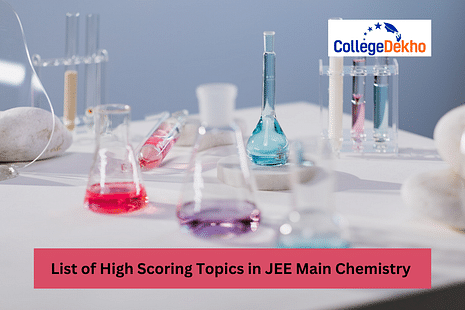This article includes an extensive overview of key topics for the Chemistry component of the JEE Main 2024 Exam. For a better understanding, candidates can analyze all the topics and their weightage.
- Most Important Chemistry Topics of JEE Main 2024
- JEE Main Weightage WiseTopics For Chemistry
- JEE Main Chemistry Scoring Concepts
- JEE Main Chemistry Important Topics Examined Previously in JEE Main/Advanced
- Chemistry Topic-wise Weightage in JEE Mains
- How to Prepare for JEE Main 2024 Chemistry
- List of High Scoring Topics In JEE Main Physical Chemistry
- List of Most Scoring Topics In JEE Main Organic Chemistry
- List of High Scoring Topics In JEE Main Inorganic Chemistry
- Ways to Excel in JEE Chemistry
- Benefits of Studying the Topics Already Covered in Previous Exams
- Why Focus More On High Scoring Topics in Chemistry for …
- Faqs

High Scoring Topics in JEE Main 2024 Chemistry: JEE Chemistry is considered a relatively easier and high-scoring subject for JEE Main 2024. This is because the paper has more theoretical and application-based questions than calculation-based ones. The student's marks in JEE Main 2024 are heavily influenced by the chemistry paper. It's important to perform well on the JEE Main 2024 to be accepted into the best engineering colleges. What are the important chapters for JEE chemistry? This is a frequent concern for aspirant students who want to perform well. We have included a list of all the crucial JEE Chemistry topics to make it easier for you to prepare for the JEE Main 2024 .
LATEST -
JEE Main 2024 session 2 exam will be held on April 4, 5, 6, 8, and 9, 2024 for Paper 1 and April 12 for Paper 2. For the majority of students attempting to take an engineering entrance exam, the chemistry section determines their rank because it focuses primarily on fundamental concepts, and because, in contrast to the math and physics questions in the JEE, Chemistry questions are more theoretical than calculative, making it easier for students to perform well in this section. The ideal method for preparing for the JEE Chemistry section is to analyze the question papers from previous years and make all the concepts stronger as a result.
All of the chemical compositions, reactions, processes, chain reactions, and question quality are extremely similar. The only variation in the questions' difficulty level in JEE exams has been asked repeatedly. Read the full article to know all the important topics of Chemistry for JEE Main 2024.
Also Read:
JEE Main Deleted Syllabus 2024
Most Important Chemistry Topics of JEE Main 2024
The detailed tabular representation of the most important Chemistry Topics of JEE Main 2024 is provided below. Candidates can go through it to know which topics they need to focus more on.
Name of the Chapter | Name of Topic | Important Topics |
|---|---|---|
Atomic Structure |
|
|
Some basic concepts in chemistry |
|
|
States of matter |
|
|
d - and f - BLOCK ELEMENTS |
|
|
S - Block Elements (Alkali and Alkaline Earth Metals) |
|
|
Co-ordination Compounds |
|
|
Purification and Characterisation of Organic Compounds |
|
|
Some Basic Principles of Organic Chemistry |
|
|
Organic Compounds containing Halogens |
|
|
Organic Compounds containing Oxygen |
|
|
Chemistry in Everyday Life |
| |
Principles Related to Practical Chemistry |
| |
Chemical Bonding and Molecular Structure |
|
|
Classification of Elements and Periodic table |
|
|
Quick Link: Top 10 Scoring Topics in JEE Main 2024 Chemistry
JEE Main Weightage WiseTopics For Chemistry
There are various topics for JEE Main 2024 Chemistry paper. Here is a list of the JEE Main Weightage WiseTopics For Chemistry.
High Weightage | Low Weightage |
|---|---|
Atomic Structure | Chemical Equilibrium |
Gaseous & Liquid State | Redox & Volumetric Analysis |
Electrochemistry | Solutions |
Chemical Kinetics | Metallurgy |
Nuclear & Surface Chemistry | Qualitative Analysis |
Chemical Bonding | Hydrocarbons |
d-Block Elements | Mole Concept |
Co-ordination Compound | Ionic Equilibrium |
Alkyl Halides | Solid State |
Aromatic Compounds | s-Block Elements |
Thermodynamics | Periodic Classification |
p-Block Elements | Classification & Nomenclature |
General Organic Chemistry | Alcohol & Ether |
Isomerism | Nitrogen Compounds & Aliphatic Amines |
Aldehydes and Ketones | Biomolecules & Polymers |
Carboxylic Acids & Its Derivatives | - |
JEE Main Chemistry Scoring Concepts
JEE Main basic concepts and scoring concepts are provided in the list below-
Basic concepts: (1-2 marks each)
- IUPAC Nomenclature
- Periodic Table
- Chemical Bonding
Easy and Scoring concepts:
- Mole Concept
- Coordination Chemistry
- Alcohol, Phenols, and Ethers
- p-Block element
Topics that must be covered at least once include Ionic Equilibrium, Alkyl Halides and Aryl Halides, Amines, Biomolecules, Environmental Chemistry, Chemical Kinetics, Isomerism of Organic Compounds, Hydrogen and its Compounds, Chemical Equilibrium.
JEE Main Chemistry- Important Topics (with 2-3 Questions each)
- Aldehydes and Ketones
- d & f Block Elements
- General Organic Chemistry
- Atomic Structure
- Gaseous State
- Hydrocarbons
JEE Main Chemistry Important Topics Examined Previously in JEE Main/Advanced
- Transition Element and Coordination Chemistry
- Periodic Table and Representative Elements
- Gaseous State
- Atomic structure
- Amines
- Solution and Colligative Properties
- General Organic Chemistry
- Carboxylic Acids and Derivatives
- Hydrocarbons
- Carbohydrates, Amino Acids, and Polymer
Chemistry Topic-wise Weightage in JEE Mains
Provided below is the list of important topics and their weightage of marks that have been quite relevant from the previous year's question paper.
Topics | Number Of Questions | Weightage of Marks |
|---|---|---|
Electrochemistry | 1 | 4 |
General Organic Chemistry | 1 | 4 |
Stereochemistry | 1 | 4 |
Carbohydrate, amino acid and Polymers | 1 | 4 |
Alkyl Halides | 1 | 4 |
Carboxylic Acid and their Derivatives | 1 | 4 |
Aromatic Compound | 1 | 4 |
Redox Reaction | 1 | 4 |
Mole Concept | 1 | 4 |
Solution and Colligative Properties | 1 | 4 |
Hydrocarbon | 1 | 4 |
Chemical Kinetics | 1 | 4 |
Solid-State And Surface Chemistry | 2 | 8 |
Thermodynamics And Gaseous State | 2 | 8 |
Chemical Bonding | 2 | 8 |
Chemical And Ionic Equilibrium | 2 | 8 |
Atomic Structure | 2 | 8 |
Nuclear Chemistry And Environment | 2 | 8 |
The Periodic Table and Representative Elements | 3 | 12 |
Transition Elements and Coordination Chemistry | 3 | 12 |
How to Prepare for JEE Main 2024 Chemistry
The chemistry subject is divided into three parts- physical, organic, and inorganic chemistry:
Physical Chemistry
Candidates are suggested to keep a notebook so they can quickly revise any easy formulas for chapters like atomic structure, solid state, ionic equilibrium, electrochemistry, and thermochemistry. Be careful of the conditions in which these equations cannot be applied directly. The above topics should be given more attention because more questions are frequently asked about these topics. Also, keep in mind that log 2 (0.3010) and log 3 (0.4771) are important numbers to understand because they frequently appear in calculations.
Organic Chemistry
Candidates should focus on various name reactions they have encountered and their mechanisms in this section. The experts advise that questions relating to reactions like Ozonolysis, Aldol, Cannizzaro, Perkin, and Hoffmann should be regularly practiced. The GOC should receive special attention (General Organic Chemistry). One should be able to compare the stability of reaction intermediates as well as questions about acidity and basicity. It is important to thoroughly study isomerism and organic molecules containing oxygen. The evaluations of the various functional groupings should also be memorized.
Inorganic Chemistry
Here again, a candidate will be required to keep a note to record minor details about the composition of alloys and the formula of ores that frequently come up in objective questions. In addition to this, the emphasis should be on topics like chemical bonding, p-block elements, and coordination chemistry because these are the ones where the majority of exam questions are formed.
List of High Scoring Topics In JEE Main Physical Chemistry
Name of the Chapter | High Scoring Topics |
|---|---|
Atomic Structure | Radius, velocity and the energy of nth Bohr orbital |
Quantum Numbers | |
Photoelectric effect | |
Debroglie wavelength | |
Line spectrum of hydrogen | |
Radial nodes and planar nodes | |
Electronic configuration of any element | |
Chemical Kinetics | Effect of Temperature on Rate of Reaction: Accurate Dependency of K on T |
First Order Reaction | |
Half Life of First Order Reaction | |
Equilibrium | Solubility and Solubility Product |
Types of Equilibrium Constant | |
pH of solution/mixture | |
Relation between Kp and Kc | |
Characteristics of Equilibrium Constant | |
Redox Reaction And Electrochemistry | Balancing of Redox Reaction: Oxidation Number Method |
Nernst Equation | |
Feasibility and Gibbs Free Energy of Reaction | |
Quantitative Aspect of Electrolytic Cell: Faraday's First Law | |
Nernst Equation for Full Cell | |
Solutions | Concentration Terms |
Depression in Freezing Point | |
van't Hoff factor(i) or Abnormal Colligative Property | |
Elevation in Boiling Point | |
Vapour Pressure of Solution Containing Non-Volatile Solute | |
Osmosis and Osmotic Pressure | |
Solubility and Henry's Law | |
Some Basic Concepts In Chemistry | Stoichiometry, Stoichiometric Calculations And Limiting Reagent |
Law of Equivalence | |
MOLE CONCEPT AND MOLAR MASS | |
Percentage Composition And Equivalent Weight | |
Reactions in Solutions |
List of Most Scoring Topics In JEE Main Organic Chemistry
Name of the Chapter | High Scoring Topics |
|---|---|
Biomolecules | Diasaccharides and Polysaccharides |
Amino Acids - 1 | |
Proteins | |
Hydrocarbons | Aromaticity |
Dehydration of Alcohol by Conc. H2SO4 | |
Markonikov and Anti-markonikov Reaction | |
Friedel craft alkylation | |
Organic Compounds Containing Halogens | Nucleophilic Substitution |
SN1 Reaction | |
Organic Compounds Containing Nitrogen | Reaction with NaNO2 + HCl |
Azo-Coupling Reaction | |
Hoffmann Bromamide Reaction | |
Test for Amines | |
Alkylation and Acylation of Amines | |
Methods of Preparation of Amines | |
Basicity of Aromatic Amines | |
Basicity of Aliphatic Amines | |
Organic Compounds Containing Oxygen | Reduction and Oxidation Reaction |
Nucelophilic Addition Reaction | |
Haloform Reaction | |
Properties of Phenols | |
Chemical Properties of Carboxylic Acids | |
Methods of Preparation of Carboxylic Acids | |
Grignard Reagent - 1 | |
Grignard Reagent - 2 | |
Reduction by LiAlH4 and NaBH4 | |
Acidity in Carboxylic Acids | |
Principles Related To Practical Chemistry | Wet Tests for Identification of Cations |
Purification And Characterisation Of Organic Compounds | Chromatography |
Carius Method (Halogen and Sulphur) | |
Some Basic Principles Of Organic Chemistry | Mixed Questions - 1 |
Structural and Geometrical Isomerism | |
IUPAC Nomenclature - 2 |
List of High Scoring Topics In JEE Main Inorganic Chemistry
Name of the Chapter | High Scoring Topics |
|---|---|
Chemical Bonding And Molecular Structure | How to Find Hybridisation |
Shapes of Molecules | |
Energy Level Diagram for Molecules | |
Electronic Configuration for Molecules | |
Classification Of Elements And Periodic Table | Ionisation Enthalpy or Ionisation Potential |
Variation of Atomic Radii and ionic radii | |
Co-ordination Compounds | Applications of CFT |
Magnetic Moment(On the Basis of VBT) | |
Stereoisomerism | |
Crystal Field Splitting in Octahedral Field | |
D - And F - Block Elements | KMnO4 |
Oxidation State | |
Magnetic Properties and Character | |
K2Cr2O7 | |
Chemical Properties of Lanthanoids |
Ways to Excel in JEE Chemistry
Here are some pointers to excel if you are aspiring to score a healthy marks in JEE Main Chemistry.Quality over quantity
Using too many reference books can leave you confused about which topic to learn from which book. This frequently results in leaving out a few things. Every student has a different understanding level, therefore you should choose books that are simple enough for you to understand. Prepare your notes once the topic and chapter have been covered.
Mock Test
The best strategy you can use to achieve a high JEE chemistry score is to take as many mock test series as you can. You can prepare for the JEE mains exam in 2024 by taking a series of practice tests based on the NTA paper pattern, which provides an idea of the kinds of questions that will be on the test.
Revision is the Key
Preparing for the JEE Main Chemistry 2024 revision should be a regular process. You should not delay revision till the completion of the whole JEE Main syllabus 2024 , you should keep revisions regular instead i.e. after the completion of every chapter. Regular revision will help you retain all the information that you have studied before. Regular revisions help you with your weak areas and make them strong. It also gives you an idea of the topics that you are lagging at.
Periodic Table
Before beginning your JEE Mains 2024 preparation, make a huge periodic table and tape it in front of your study desk. Finding the physical and chemical properties of the elements will be made easier by memorizing and recalling them.
Learn Formulas
Acquiring a thorough knowledge of radioactivity, kinetics, equilibrium, and chemical bonding formulas. You will have enough time in the exam to spare if you memorize the formulas. It will decrease the number of calculations as well as the possibility of errors.
Focus on all 3
Develop a strategy to dominate all three aspects of chemistry. To do well in the JEE Mains 2024, you must have a strong command of all three subjects.
Benefits of Studying the Topics Already Covered in Previous Exams
There are several benefits to solving previous years' JEE Main question papers.
The following are the top five benefits of solving previous years' JEE Main question papers:
- Better Time Management
- Practice Makes Perfect
- Improve the JEE Main Preparation Methods
- Get Familiar with the Exam Pattern
- Evaluate the Areas of Strength and Weakness
- Revise regularly what you study
- Solve mock test papers
Time Management
Candidates are required to manage their time wisely once they start attempting previous years' question papers. One of the most significant advantages of solving previous years' JEE Main question papers. Besides that, it is regarded as a very good practice. It not only increases speed but also enhances accuracy over time. Moreover, time is crucial when taking any exam, and in the case of JEE Main, it is one of the most important factors.
Proper time management can produce significant benefits, and candidates can complete the paper on time.
Practice More
As the proverb goes, "practice makes perfect," thus everything that has been regularly practiced will result in improved outcomes. In this situation, students are automatically expected to perform well if they spend a lot of time studying questions from prior exams. Other than that, using past JEE Mains practice exams is the sole way to gauge one's level of preparedness. The candidates can now assess their degree of readiness immediately. Additionally, based on their evaluation, candidates might concentrate on bridging the preparation gap.
Know Your Exam Pattern
The JEE Main exam is one of the most difficult national-level exams, and competition is tough throughout the exam. As a result, to start preparing, the candidate needs to be aware of the exact exam format.
Evaluate Your Preparedness
As you go through the question paper, make sure to read it attentively. Mark the questions that are known, and leave the others blank. It is the best technique for responding to both known and hypothetical topics. Additionally, candidates can classify the exam in terms of difficulty level - difficult, moderate, or easy after completing JEE Main papers of previous years.
Solve Mock Test Papers
It is highly recommended that students regularly complete mock tests. Students can assess their level of preparation and improve their problem-solving skills by taking mock exams. Students are advised to finish three hours of timed online mock tests. Candidates who want to pass the JEE Main exams might select the NTA portal or any other website that provides free mock tests.
Revise Regularly What You Study
No matter how well you prepare, revision is still important before any exam. Exam preparation improves applicants' conceptual memory. Any topic that has been reviewed will help a candidate remember all the key details that they would otherwise be unable to or more likely to forget during the exam.
Improve JEE Main Preparation Methods
Improving JEE Main preparation should be the ultimate goal. By solving questions from the previous year, you can acquire a sense of the exam format and the number of questions from various sections of the course. Students should always maintain flexibility in their schedules and methods for studying for exams because of this. They will naturally be able to improve themselves and their preparation methods because of it. They can also set aside time to revise the most recent syllabus updates and concentrate more on their areas of strength and weakness.
Why Focus More On High Scoring Topics in Chemistry for JEE Main 2024?
Understanding the importance of focusing on the most scoring topics in Chemistry for JEE Main 2024 is crucial for securing a good score in the JEE Main exam. Some of the top five reasons why every JEE Main aspirant should prioritize the most important topics in Chemistry for JEE Main have been listed below.
- Key Concepts: These topics form the core of the subject.
- Weightage: Easy and scoring chapters for JEE Main Chemistry carry more weightage in the exam.
- Overall Score: Focusing on the high scoring topics in JEE Main Chemistry contributes to an overall good score.
- Deeper Understanding: They enable in developing a deeper understanding of the subject.
- JEE Advanced Preparation: Mastery of the high scoring topics in JEE Main Chemistry also aids in the JEE Advanced 2024 preparation.
Also Check, JEE Main Subject Wise Syllabus 2024
Related Links to Download JEE Main Question Paper PDF
The table below features year-wise JEE Main Question Papers that students can practice thoroughly after revision.

















Similar Articles
Gujarat Polytechnic Admission 2024: Final Seat Allotment (Available), Dates, Counselling Process, Registration, Eligibility
JoSAA Round 5 IIT Cutoff 2024: Check Opening & Closing Ranks
List of Colleges for 80,000 to 1,00,000 Rank in AP EAMCET 2024
List of Colleges for 50,000 to 75,000 Rank in AP EAPCET (EAMCET)
List of Colleges for 25,000 to 50,000 Rank in AP EAMCET 2024
List of B.Tech CSE Colleges Accepting 10,000 to 25,000 Rank in AP EAMCET 2024